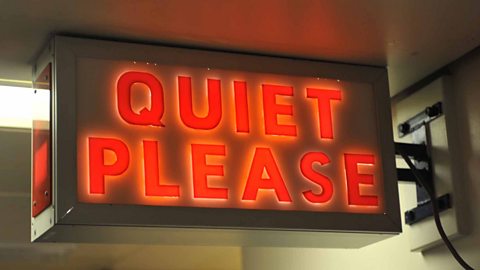The glories of being quiet
Philosopher and adventurer Erling Kagge – the first person to reach the ‘three poles’ of North, South and the summit of Everest – explores the power of silence in the book Silence. He asks why we need it, how we lost it and where we might go to find it again.
Silence can be a sign of loneliness, boredom or sorrow. But in this cacophonous world of traffic, smart phones, flight paths and funfairs, it is also the window to a wealth of wonders.
-
![]()
Silence
What can silence mean? Bridget Kendall and guests contemplate a lack of noise.
-
![]()
Short Cuts: Silent Night
Josie Long listens for the sounds that lurk in the darkness.
-
![]()
Welcome to the Quiet Zone
Emile Holba explores the National Quiet Zone, 13,000 square miles of radio silence.

Silence allows us to feel present
“Antarctica is the quietist place I’ve ever been,” says Erling. He explains how the silence that he encountered on his Antarctic expedition allowed him to feel more present: “I became more and more attentive to the world of which I was a part. I was neither bored nor interrupted. I was alone with my own thoughts and ideas… I was present in my own life.”
We live in the age of noise. Silence is almost extinct.
We can’t all head off to an icy wasteland at a moment’s notice, but finding a silent space – be it a bedroom, some quiet corner of a garden, or a toilet cubicle – can help us to take a moment out of the rush and clamour of our daily routines and reconnect with ourselves. Erling believes that we can all find our “internal silence” and suggests “standing in the shower… sitting in front of a crackling fire, swimming across a forest lake, or taking a walk over a field. All these can be experiences of perfect stillness.”
Silence gives us space to think
Silence is “a key to unlock new ways of thinking,” says Erling, and science supports the philosopher’s theory. Even without the stimulus of sound, our brains remain active and dynamic.
A 2001 study defined a “default mode” of brain function, explaining that a “resting” brain is still constantly at work, absorbing and evaluating information. Subsequent research has shown that this default mode also helps us to self-reflect. The 2013 paper Frontiers in Human Neuroscience states that when the brain rests it is able to integrate internal and external information into “a conscious workspace.”
Silence and rest could be the key to our best creative thinking and our greatest ideas.

Why silence is the enemy of peace
Dr David Toop discusses sound and modern technology.
Silence is a powerful tool in conversation
In conversation or debate, it is easy to forget the power of silence. But staying quiet is a tool that we all have in our conversational toolbox. In the words of the Roman orator Cicero, “Silence is one of the great arts of conversation.”
By staying silent in a conversation or debate, you are naturally listening more and giving others the opportunity to share.
Silence can be the space between an unhelpful outburst of feeling and a considered response. By taking a pause you can then speak more calmly and wisely. It also shows strength and confidence in an argument. “Nothing strengthens authority so much as silence,” said Leonardo da Vinci.
But as well as helping us to defeat an opponent, it can help us to nurture our relationships.
By staying silent, you are naturally listening more and giving others the opportunity to share.

Silence might actually help our brains to grow
In 2013, biologist Imke Kirste was testing the effects of sound on the brains of mice. The results were surprising: the sounds had no lasting impact yet two hours of silence a day prompted cell development in the hippocampus, the part of the brain that helps memories form. It wasn’t sound itself but the very absence of it that was creating new cells in the brains of the mice and, although the growth of new brain cells doesn’t necessarily have health benefits, these cells seemed to become functioning neurons.
The more we are inundated with messages on our phones, the more we wish to be distracted. We check and recheck our phones in the attempt to achieve satisfaction.
If a link between silence and the generation of neurons can be established in humans too, there’s a chance that silence could be used to help patients with conditions associated with decreasing neurogenesis in the hippocampus, like dementia and depression.
Silence is the antidote to social media
“Anticipating the noise of a screen or keyboard is addictive,” warns Erling. “The more we are inundated, the more we wish to be distracted… We check and recheck our phones like a one armed bandit, in the attempt to achieve satisfaction.” But rather than finding fulfilment, “this form of noise engenders anxiety and negative feelings.” We might be hooked on social media, but it doesn’t mean we’re happy.
“Silence,” says Erling, “is the opposite of all this. It’s about getting inside of what you’re doing… not living through other people and other things.”
It might be a daunting thought, but try a tech blackout for a few hours. Build these breaks up slowly until you can go for a whole day without your phone or tablet. The absence of those pings, rings and buzzes might just make you happier.

Silence helps to relieve stress
Florence Nightingale wrote, “Unnecessary noise is the most cruel absence of care that can be inflicted on sick or well.” The nurse argued that every needless sound could cause alarm, distress, and sleep-loss for recovering patients. Modern research supports her views: correlations have been discovered between high blood pressure and chronic noise – like roads and airports.
Silence and rest could be the key to your best creative thinking and your greatest ideas.
Noise can also result in elevated levels of stress. It is thought that sound waves activate the amygdalae, which is associated with memory formation and emotion, causing a release of stress hormones. This process can occur even as we sleep.
Silence, however, has the opposite effect. It helps to release tension in the brain and body. A study published in Heart journal found that two minutes of silence can prove to be even more calming than listening to “relaxing” music. It might be time to turn those tunes down…
More from Radio 4
-
![]()
Silence
What can silence mean? Bridget Kendall and guests contemplate a lack of noise.
-
![]()
Welcome to the Quiet Zone
Emile Holba explores the National Quiet Zone, 13,000 square miles of radio silence.
-
![]()
Short Cuts: Silent Night
Josie Long listens for the sounds that lurk in the darkness.
-
![]()
How having a purpose brings clearer pathway through the dark and difficult winter days.




